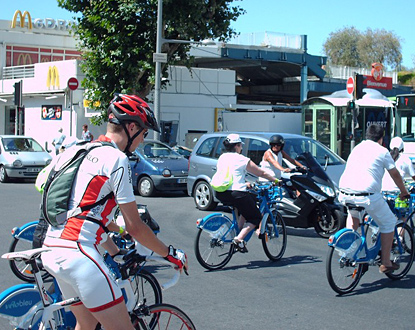The early results of the survey on “Bikes and the French in 2012” are very encouraging for the development of daily bicycle use. As a reminder, more bicycles than cars are sold each year in France: 3.2 million bicycles / 2.25 million new cars.
There is also a parliamentary club for cycling, which includes two elected officials from the Alpes-Maritimes, Lionnel Luca and Louis Négre.
Since its inception, the Club has put forward several proposals, especially during the review of the 2013 Finance Bill and the Social Security funding, in favor of economic incentives for companies that provide bicycles to their employees, contribute to their travel expenses with a mileage allowance, as well as for the combination of reimbursement of public transport subscriptions and bike rental.
Focus on the first results.
*The practice of cycling is increasing both for leisure and utilitarian mobility among the French.*
• 45.5% of respondents aged 15 and over have cycled at least once in the past 12 months, which is nearly 1 in 2 French people. According to the study “The Economy of Cycling” (Atout France 2009), they were 40% in 2007 within the same group.
• 97.9% report having learned to ride a bicycle and 78.2% say they cycle very well.
*Utility use of bicycles is growing. Recreational use, already well-established, is expanding.*
• 14% use the bike for “utilitarian” reasons such as going to work, school/university, or shopping (among the 98% of the population that learned how to ride a bike).
*The bicycle is becoming ingrained—not just in practice but in lifestyles.*
• Intermediate professions (nurses, teachers, social workers) use bicycles more (63.5% of respondents) compared to the entire population, closely followed by the higher social categories (senior executives and professionals) at 61.2%.
• One-third of those aged 15 and over say they will use a bicycle for their regular commuting in the next two years.
*Owning a bicycle or having access to a bike-sharing system (VLS) increases use and more frequent use.*
• 70% of respondents owning a bike used it in the last 12 months, and 17% used it at least a few days a week. In contrast, only 56% of those who use a bike from the household use it, and 7.5% use it regularly.
*The bicycle is emerging—alongside public transport—for commuting and has strong potential.*
• Among the 28.5 million working people in France, 5.3% already use bicycles for commuting at least a few days a week.
*The bicycle is “the two-wheel solution”—and not the motorized two-wheelers.*
• Of the 98% of the French population who learned to ride a bicycle, 5.3% use it for commuting a few days a week, against 3.4% who use a motorized two-wheeler. For shopping, errands, or leisure activities, 15.9% travel by bicycle compared to 8.4% with motorized two-wheelers.
These early results confirm the need for a national bicycle policy—a framework to act on the right levers to encourage the development of “bicycle as a means of transportation”—a crisis-proof solution serving sustainable mobility—of “leisure cycling”—a practice already well-established—and of “cycling tourism and sports,” benefiting from its virtues notably in terms of public health.


